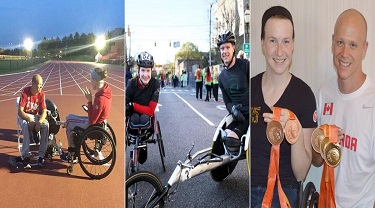Alexandre Dupont, an above-knee amputee who competed in Paralympics in London in 2012 and Rio in 2016, was looking for a better roller on which to practice his wheelchair racing. His wife, Ilana, who competed in Beijing in 2008 and Rio in 2016, was also in the market. Alexandre put his design skills to the test and built a prototype. From there their business, Revolution Sport Equipment, was born and is now based in Saint-Georges-de-Clarenceville, Quebec.
The roller—their first product of what is now a handful—is for wheelchair racers. They mount their chairs on it to train for their sport indoors.
“It functions like a treadmill for wheelchair racers,” says Ilana, who was managing their business while Alexandre was away for five weeks, first racing at the Grand Prix event in Dubai and then later at the Commonwealth Games in Gold Coast, Australia.
After the roller, they developed a portable roller that elite athletes use when they’re travelling—just as Alexandre, who lost his right leg in a motorcycle accident at the age of 17, is at the moment.
Their serendipitous business model has been to fill their own needs as athletes and then market their innovations through word of mouth on the global Paralympic circuits. In addition to the original and portable rollers, their products today include a travel case for racing wheelchairs, throwing chairs (for throwing shot put and discus from a seated position) and accessories and gloves. Their tagline, “We are athletes making quality products for other athletes,” couldn’t be more apt.
“We manufacture and retail sporting equipment for people with physical disabilities, mostly in the wheelchair racing market,” says Ilana, who became paraplegic after a horseback riding accident in 2000. She adds that they’ve been exporting since 2013 and have sold all over Europe and North America as well as in Japan, Korea and Australia.
“It’s all ideas from my husband’s mind,” she says of the product line. “It’s equipment that existed before and we took it and made it better. We want to offer a quality product at a reasonable price. There’s not a ton on the market.”
Word-of-mouth business kept them very busy for the first few years of business, to the point where they didn’t even have a website until recently. With the increase in demand, they hired Alexandre’s brother Sébastien to help on the manufacturing side of things. He keeps everything running smoothly while Ilana and Alexandre are travelling for competitions.
“We had the website set up, but it wasn’t live because we couldn’t keep up with existing demand,” she says.
Last year was their best year yet. A loan from the Business Development Bank of Canada allowed them to buy equipment to streamline their in-house manufacturing facility and help them to build up some inventory.
And what’s next for these full-time athletes and Paralympic entrepreneurs? In addition to continuing to grow their business, they are both planning to compete in the Paralympics in Tokyo in 2020.
What was your first export sale?
It was rollers going to the United States. The University of Illinois has one of the best training programs in the world and they have a massive training room. They were one of our first customers and a lot of our sales in the U.S. have come from that initial contact. From them, we realized how many racers out there are just doing it for fun, competing at local meets and training for fitness. There are so many athletes, ranging from recreational all the way up to the elite level. That’s created a whole new business line for us.
What do you know now that you wish you’d known when you were starting out?
Everything. I had to go back and fix a lot of the mistakes. But I’ve learned a lot from making them.
Can you share a bad experience and the lesson learned?
We had a large shipment of rollers going to the U.S. We decided to ship from Canada ourselves instead of using a broker to file our paperwork to cross the land border as we usually do, since we live so close to the U.S. border. There was an issue with the shipment and in the end, it was a costly mistake for us and for the customer because it took so much longer to get there.
What’s your best piece of advice to business owners looking to export?
Maybe take a course about how it all works. It’s so intimidating at first. Make sure you have the right paperwork, and you’re filling it out correctly. I’ve been able to do a lot of research online and find answers by contacting Canada Border Services Agency and U.S. Customs and Border Protection.
What is the one characteristic every exporter should possess?
Confidence in what you’re doing and having a good knowledge base. If you don’t, you can get in a lot of trouble. To ensure your customer is happy, you have to know what you’re doing.





